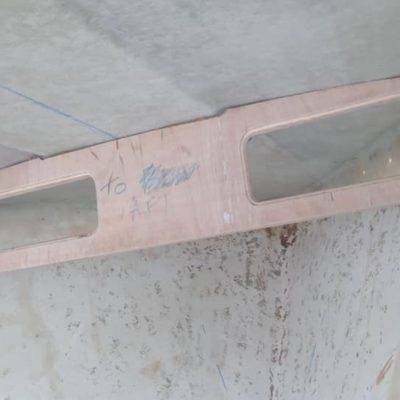Forum Replies Created
-
AuthorPosts
-
Hello J,
It’s a hard one to visualise. I can offer some breadcrumbs.
To me, my first thought would be to continue with the inflatable material on the outside, PVC or even better Hypalon, chlorosulfonated polyethylene (CSPE) synthetic rubber. They’re impressively solid materials when you bring air pressure into the mixture and they offer chemical, heat and ultraviolet light resistance. Obviously, they can cope with expansion, flex etc. If the inner hull was GRP fibreglass, it would mean you could have chambers on top of chambers, even if they got damaged the grp hull would still hold the water.
If that’s not what you’re after,
Some questions come to mind, is the boat designed to be hauled out? or do we have foul build-up to contend with? does it need to be rigid enough to land on a stoney beach etc? Will it be designed for longevity, replaceable? repairable.I feel like perhaps you’re looking more into a solid rubber, UV resistance, salt resistant, flex. Off the top of my head, I can’t think of a rubber suitable, but I know where I’d look.
High end – Diving gear, flippers, fins they would need all of the above and they would need to hold up flex, without wear.As a side note, you can actually buy a flexible additive for polyester resins which make the resin flexible once set. I’ve used it and works great. I’ve never tried add a flexible additive to the fibreglass layer itself.
I bet your guys at Eastcoast fibreglass would have some suggestions for you.Feel free to send over any other question, I hope that’s of help.
-
This reply was modified 4 years, 3 months ago by
 Louis.
Louis.
Hey Marc, for the non-sailors out there, can you explain what is you’re doing with the legs? Love the idea. My motor cruiser is the semi-displacement single keel, so the thought of grounding out in the channel terrifies me, obviously I have no intention in letting it happen! Not having bilge keels, is a definite con. Are the legs to be used on hardstanding only? or are they for dry berths? Also, the mud in the channel and surrounding is so bad that your leg might sink/plunge through it like butter. What if your leg was to get stuck in the mud or on a rock?
Here she blows
Attachments:
Awesome work Mark, what roller sander did you go for out of interest?
How does a roller sander compare to say a flapdisc on an angle grinder. I’ve a attached a photo of my leg tattoo. I think grinders are the king of the tools. like me. ?-
This reply was modified 4 years, 8 months ago by
 Louis.
Louis.
Hey Alan , Sorry I missed this did you go for it the end? As far as I’m ware its a nice little river and canal boat, are you based in the UK?
Hey Alan , Sorry I missed this did you go for it the end? As far as I’m ware its a nice little river and canal boat, are you based in the UK?
,
Hey Michael, the first idea that came to mind was using Owatrol Marine Strip, but I seem to remember something in the technical data about it not stripping polyurethane paints, so I’m guessing it might be the same for marine varnishes that are often made from polyurethane. Strippers can work wonders, but they’re messy and you need the right type.
Obviously, as the mast is a cylinder that rules a scraper out of the equation. What about getting a piece of hard foam and cutting it to the shape of the mast, then binding to it a low low grit sandpaper over the shape using contact adhesive or epoxy. If you use the belt sander pads, they last a longer than standard sand paper a hell of a lot longer,If these all faile perhaps you could try the wooden boat forum –
there’s a lot of experts on that page, they will have done it for sure! https://www.facebook.com/groups/45928256385/Hope that helps
Hello Manuela,
Can you explain how you found the void in the wood once it was constructed, was it loose and detaching from the underneath layers of plywood?Hello Maxwell,
If you require an advertisement or backlink from BRP please get in contact with
[email protected] for a very affordable fee.Kind Regards
LouisUpps was definitely meant to delete this haha!
Hello Nick, Thanks for posting I’ve keep an eye out for a mast for you. Let me know if you find what you’re looking for.
Thanks for sharing Niel, I will post your video on greasing a which this afternoon with a link to your blog.
Hey David beautiful project by the way- I’ve used Hempel – Bilge And Locker paint with massive success. When I first moved on to my Jaguar 27 the paint under the half berths was flaking off and covered in thick black mold. I had the luxury of being able to to get under there with a jet wash on a hot day and blast it off. The place got soaked but it did the job quickly. I then cleaned with a large sponge. Lastly I did a light hand sand over the entire area that I was going to paint.
I used an electric fan heater to dry the area and applied Bilge and locker paint which is a 1 part enamel. After 2 years of sleeping in their /kicking getting damp it held up amazingly. you shouldn’t need a primer and it’s fairly thick and will only require 1 thick coat with a second for patching up.
I personally would only ever use that now having had amazing results. I’ve used white but would advise a light grey. -
This reply was modified 4 years, 3 months ago by
-
AuthorPosts


